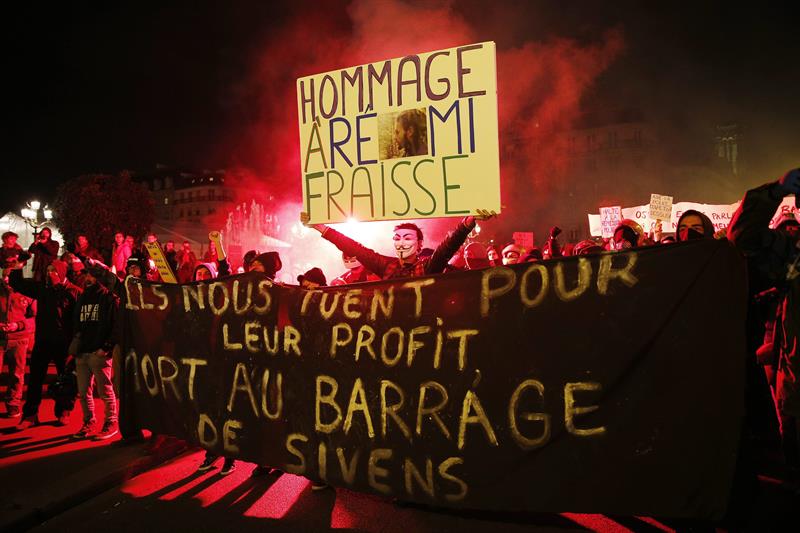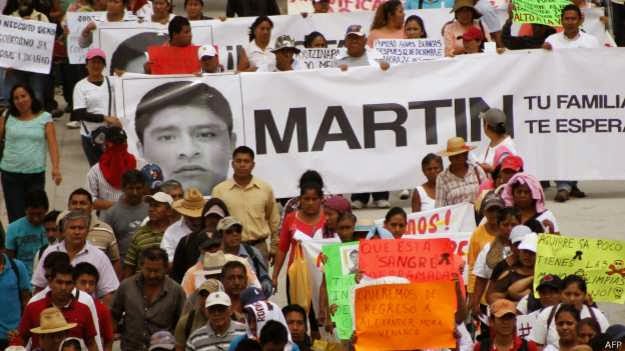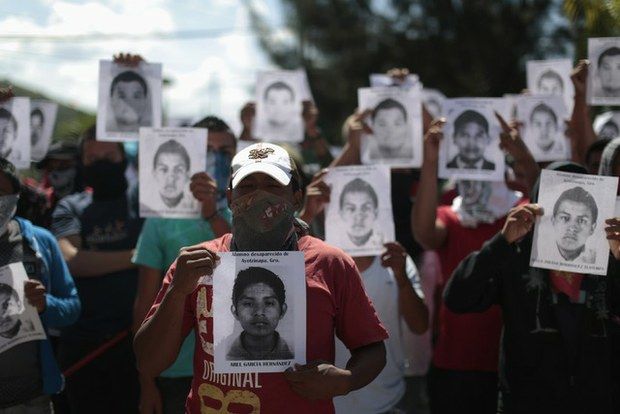Egypt
Act Two of the revolutionary process
29/11/2011
By Claudia Cinatti
Thursday, November 24, 2011
The brutal police repression against a small group of demonstrators in Tahrir Square on November 19 was the detonator of an impressive popular mobilization that was increasing in numbers and radicalization as time passed. The policy of the governing Supreme Council of the Armed Forces (SCAF), of trying to stop this new wave of demonstrations with the police forces from Central Security, that fired poison gases, rubber and lead bullets, leaving 35 people dead and more than 2,000 wounded, had a contrary result to that hoped for by the military junta: hundreds of thousands of people in the streets of Cairo, Alexandria, Suez and other big Egyptian cities demanded that the military government and its leader, Marshal M. Tantawi, who took office after the downfall of the pro-imperialist Mubarak dictatorship, should leave. This crisis erupted only one week before the elections for the legislative body responsible for drawing up the new Constitution, that were going to take place on November 28.
If, during the days that led to Mubarak’s fall, the army appeared as a "friend of the people," winning the trust in order to take on the "transition," after the experience of nine months of military government, that illusion no longer exists: the repressive apparatus of Mubarak’s regime remains intact; the Emergency Law that permits arbitrary detentions continues in force; around 12,000 activists have been arrested, tortured and prosecuted by military tribunals, in some cases, only for criticizing Marshal Tantawi in an article; the military junta approved new legislation that prohibits the right to strike and the independent organization of the workers, while the living conditions of the workers and young people, who are those that suffer most from unemployment, and of the masses of the people, have continued to deteriorate. The straw that broke the camel’s back was the announcement of the so-called "supra-constitutional regulations," by means of which the army reserved absolute power for itself over military matters (like the budget, which includes US "assistance" of 1.3 billion dollars) and the right to veto any article of the new Constitution — which still remains to be written — that, in its judgment, threatens the "basic principles of the state. To this is added the fact that the SCAF had planned to remain in power until at least 2013.
Even the Muslim Brotherhood, the main political-religious organization of the country, that was the principal support of the military government and, during these months, boycotted every mobilization, found itself forced initially to call for mobilizing against the "supraconstitutional" laws of the military junta, since it sees that measure is also aimed at curbing its goal of giving constitutional recognition to Islamism, or possibly obstructing its access to the government.
In view of the deepening crisis, Essam Sharaf, the Prime Minister, and his Cabinet, a "civilian" government, a puppet of the army, resigned, and, on November 22, Marshal Tantawi addressed the country, announcing the agreement that had been reached with the Muslim Brotherhood and other parties, of keeping the November 28 legislative elections, to form a government of "national salvation," and hold presidential elections in mid-July 2012. But the pact between the military and the Islamists was not enough to bring the crisis to an end. The perception of open collaboration of the Muslim Brotherhood with the SCAF has already caused a split among its young supporters and led to one of its leaders being expelled from Tahrir Square, even before the dialogue with the military junta was announced. After Tantawi’s speech, the streets were filled with demonstrators asking for the end of the government.
As this article went to press, thousands of demonstrators, nearly all of them young people, many of them workers, coming from popular groups, were carrying out a pitched battle in the area around Tahrir Square, against the military police, led by the Ministry of the Interior and guarded by the armed forces. The offensive attempted by the SCAF, to stay in power and preserve the core of the previous regime, through repression against the workers and the vanguard of the youth, was beyond the relationship of forces established in February, and, in that way, ended up giving rise to the most explosive situation since the mobilizations that ended with Mubarak’s downfall, relaunching the revolutionary process.
A crisis for imperialism
The situation that opened up in Egypt shows that the different imperialist policies that include diversions with "transitional governments," support for open repression, as in Bahrain, and even direct intervention, like that of NATO in Libya, were not sufficient to reverse the state of rebellion in which the region finds itself, almost a year after the "Arab Spring" began.
The US is the main support of the Egyptian military government and was the principal architect of the "transition." Over and above Obama’s hypocrisy, like that during the January-February uprising, when he supported Mubarak up to the last minute, his policy now is to preserve, as much as possible, the power of the military to maintain "order," by repressing the most radicalized groups in the mass movement, and to act as a counter-weight to a possible government with moderate Islamist influence, that is one of the likely prospects if the Muslim Brotherhood manages to assert itself as the main political force. For the US, the army is the pillar of the Egyptian capitalist state and the guarantee of its interests in the Middle East, among them, the peace with the State of Israel, and the police role that the army and the regime play, to keep the Palestinian people subjugated, which would be at risk, if the masses made the army’s power falter.
Down with the Military Junta! No to the trap of the "government of national salvation"
The military men, the Muslim Brotherhood, the Salafist groups (more extreme Islamists), and liberal parties, as well as reformist organizations that seek to limit the process that began in January-February to getting only some formal democratic concessions, have arrived at an agreement to set up a "government of national salvation," after which the armed forces would continue to wield power. There is even speculation that M. El Baradei, who has a certain influence among middle-class groups, would be willing to take office at the head of that government. In this way, they seek to deactivate the mobilizations and to try to recover some legitimacy, in order to carry out the parliamentary elections, in which the Freedom and Justice Party, a political organization of the Muslim Brotherhood, hopes to prevail. This policy has the support of the US and other imperialist powers, that see the risk that the revolutionary process will intensify. In addition to the Muslim Brotherhood, that enjoys mass support both among bourgeois and middle-class groups, and among the most impoverished strata of the population, several organizations with influence on the mobilizations are working in favor of this reactionary option, among them, the Coalition of the Youth of the Revolution, that is seeking to impose the slogan, "Transfer of power to a civilian government."
However, this attempt of the army and the ruling class to change the course with a cosmetic replacement of political personnel now seems unlikely to be enough to shut down the cycle that began in January. The forces that are propelling the revolutionary process in Egypt, as one of the most advanced expressions of the "Arab Spring," are profound, and they combine democratic aspirations, after enduring decades of despotism and dictatorships, with structural demands like work, wages and hatred of the military and civilian elite, that have been enriching themselves at the expense of the poverty and subjugation of the great majority of the population, in the context of an historic crisis of capitalism. Precisely these demands led to the working class, together with the mobilization of the impoverished urban middle classes, the youth and the unemployed, intervening decisively to accelerate Mubarak’s downfall, and to the fact that, once the government of the Military Junta was installed, an unprecedented strike wave, with political demands like the expulsion from the factories of directors linked to the dictatorship, and a process of organizing independent unions, in opposition to the union bureaucracy, followed. Some groups, like the textile workers of Shebin al-Kom, north of Cairo, with their struggle imposed the re-nationalization of three plants that had been privatized in 2007. In September, thousands of physicians, health, education, and transport workers kept up an historic strike.
The big lesson of the Egyptian process (and of the "Arab Spring" in general) is that none of the profound structural demands of the mass movement can be resolved within the frameworks of capitalism, and that it is not enough to overthrow a government, however reactionary it may be, but it is necessary to destroy the bourgeois state and the social relationships of exploitation on which it is based. Contrary to those who see "easy" victories of the masses, we revolutionaries of the FT have maintained that Mubarak’s downfall was a big popular victory, but that it is the first step, and not the end, of the revolutionary process. The profoundly reactionary and pro-imperialist character of the government of the military junta and the dynamic of the current events confirm this definition
The only road to defeating the army, the capitalists and imperialism, is sealing the alliance between the workers, young people, the unemployed and the poor of the cities and the countryside, to prepare the insurrectionary general strike to overthrow the military government and its civilian puppets, and install a government of the workers and the people.
24-11-2011


![Declaration of the Movimiento de los Trabajadores Socialistas [MTS] facing the brutal murder and disappearance of the normalistas students of Ayotzinapa](https://www.ft-ci.org/IMG/arton8590.jpg?1687978277)











